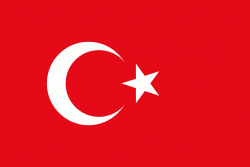Yıldırım (Yıldırım İlçesi)
Yıldırım is a metropolitan district that covers 399 km² in the centre of Bursa in Turkey. Founded in 1987, it was named after Ottoman Sultan Bayezid I, whose nickname was Yıldırım ("thunderbolt" in Turkish).
It is at the foot of Mt. Uludağ, at 150–155 metres in elevation. Kestel and Gürsu are to its west, and the flat lands of Demirtaş, a subdistrict of Osmangazi, are to its north. The Bursa-Ankara highway passes through it.
The Bursa Uludağ Aerial Lift (Teleferik, pictured to the right) is an aerial lift serving Mt. Uludağ. Built by the Swiss company Von Roll Holding and opened on 29 October 1963, the aerial tramway was replaced in 2013 by a modern and much bigger capacity gondola lift system by Leitner Group of Italy.
With Osmangazi and Nilüfer, Yıldırım constitutes the Bursa metropolitan municipality.
Yıldırım has 66 quarters and a village called Cumalıkızık, whose well-preserved historical Ottoman architecture attracts many visitors.
Yıldırım is one of Turkey's important textile production centers. With a population of 629,702 at the 2000 census, it is also one of Turkey's most populated areas; 30% of Bursa's population lives in the Yıldırım district.
* Yeşil Mosque (Green Mosque)
* Yeşil Türbe (Green Tomb)
* Bayezid I Mosque and (külliye) complex (Yıldırım Camii ve külliyesi)
* Emir Sultan Mosque
It is at the foot of Mt. Uludağ, at 150–155 metres in elevation. Kestel and Gürsu are to its west, and the flat lands of Demirtaş, a subdistrict of Osmangazi, are to its north. The Bursa-Ankara highway passes through it.
The Bursa Uludağ Aerial Lift (Teleferik, pictured to the right) is an aerial lift serving Mt. Uludağ. Built by the Swiss company Von Roll Holding and opened on 29 October 1963, the aerial tramway was replaced in 2013 by a modern and much bigger capacity gondola lift system by Leitner Group of Italy.
With Osmangazi and Nilüfer, Yıldırım constitutes the Bursa metropolitan municipality.
Yıldırım has 66 quarters and a village called Cumalıkızık, whose well-preserved historical Ottoman architecture attracts many visitors.
Yıldırım is one of Turkey's important textile production centers. With a population of 629,702 at the 2000 census, it is also one of Turkey's most populated areas; 30% of Bursa's population lives in the Yıldırım district.
* Yeşil Mosque (Green Mosque)
* Yeşil Türbe (Green Tomb)
* Bayezid I Mosque and (külliye) complex (Yıldırım Camii ve külliyesi)
* Emir Sultan Mosque
Map - Yıldırım (Yıldırım İlçesi)
Map
Country - Turkey
 |
|
| Flag of Turkey | |
One of the world's earliest permanently settled regions, present-day Turkey was home to important Neolithic sites like Göbekli Tepe, and was inhabited by ancient civilisations including the Hattians, Hittites, Anatolian peoples, Mycenaean Greeks, Persians and others. Following the conquests of Alexander the Great which started the Hellenistic period, most of the ancient regions in modern Turkey were culturally Hellenised, which continued during the Byzantine era. The Seljuk Turks began migrating in the 11th century, and the Sultanate of Rum ruled Anatolia until the Mongol invasion in 1243, when it disintegrated into small Turkish principalities. Beginning in the late 13th century, the Ottomans united the principalities and conquered the Balkans, and the Turkification of Anatolia increased during the Ottoman period. After Mehmed II conquered Constantinople (Istanbul) in 1453, Ottoman expansion continued under Selim I. During the reign of Suleiman the Magnificent, the Ottoman Empire became a global power. From the late 18th century onwards, the empire's power declined with a gradual loss of territories. Mahmud II started a period of modernisation in the early 19th century. The Young Turk Revolution of 1908 restricted the authority of the Sultan and restored the Ottoman Parliament after a 30-year suspension, ushering the empire into a multi-party period. The 1913 coup d'état put the country under the control of the Three Pashas, who facilitated the Empire's entry into World War I as part of the Central Powers in 1914. During the war, the Ottoman government committed genocides against its Armenian, Greek and Assyrian subjects. After its defeat in the war, the Ottoman Empire was partitioned.
Currency / Language
| ISO | Currency | Symbol | Significant figures |
|---|---|---|---|
| TRY | Turkish lira | ₺ | 2 |
| ISO | Language |
|---|---|
| AV | Avar language |
| AZ | Azerbaijani language |
| KU | Kurdish language |
| TR | Turkish language |















